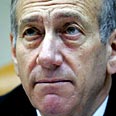
The revolution has begun
Olmert's slip of the tongue, whether intentional or not, has set the way for a new rule of government
Into the third week of the second war in Lebanon, a small revolution has taken place, a swift and decisive one, one whose end will bring about a change in the country's rule.
An important social sector has raised its head as a result of Prime Minister Ehud Olmert's slip of the tongue, whether intentional or not. It has pounded on the table and forced its stand on the cabinet and its leadership, without negotiating teams or settlements distributing the spoils.
And what did Olmert say? He said that in his opinion this war would strengthen the need for his realignment plan. Two hours after uttering these words he received an ultimatum: if this issue is still alive, said the West Bank settlement representatives in the Knesset, we shall call our people home: from junior to senior officers, those in the standing and reserve army, as well as the people of Eli, Itzhar, Beit El and Ofra. These are the spears with which you have embarked on this war, and he who controls these spears cannot permit himself to threaten them with the destruction of their homes. That's what Knesset member Benny Alon said in a statement that is an explicit threat calling for rebellion, unheard of in the region since the War of Independence.
And indeed within 12 hours, Ehud Olmert folded, as no prime minister has folded since Benjamin Nethanyahu vis-à-vis the Khaled Mashaal affair.
This event, which was almost washed away in the blood of the innocent, precedes the new reality that will set in when the war is over: a political, civilian earthquake, whose statement by the settlers' representatives in the Knesset will sound the first note.
In the second phase of this development, a determined home front will direct everything it has towards a conflict with the cabinet in its bid to hold it accountable.
Home front regains its voice
The very people who were once simply termed "the home front", just a faceless amorphic image, have regained their voices and they are becoming stronger from one news broadcast to another. They are asking for compensation and appreciation, consideration and partnership. They are currently doing so in faint whispers, but after they return home to discover the physical and social damages, the economic hardships and the security dilemmas, their voices will resound loudly.
They too are part of the security budget, they will say, they too want the terms given to career army soldiers, including life insurance with free dental care and a nice pension at an early age. They will say that they have spent many years in this war, where only prime ministers and generals switch places, but they are permanent soldiers.
Demanding to be heard
They and their brothers from the peripheries, along with Jerusalem's bus passengers, the heroes of Nahariya and Carmiel, the underprivileged from Tiberias, the farmers at Mrar, Saar, Dovev and Shtula, the bus drivers, the firefighters from the north, the Naraiya hospital staff and the welfare people at the Tiberias city hall, will all demand to be heard.
Therefore, it is unacceptable, that these voices, including those of the settlers and new immigrants, will not be represented at the cabinet. The intermediate phase will be, how surprising, the establishment of an emergency cabinet, in order to heal the wounds and to cover the leaderships' hides.
Those who remained silent throughout the war will have to start looking for jobs, because they will have to make room for representatives of the people. And the prime minister, who himself is a role model of political survivability, more than alluded this week, that he understand the new rules of the game.










